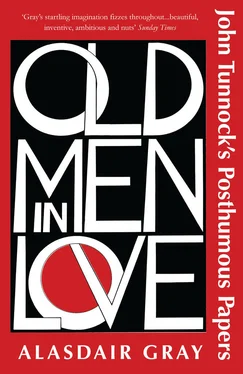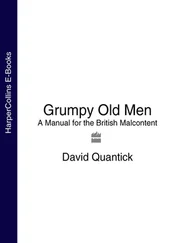Henry said, “Dear sister — dear all of you, I am tired. The Spirit has wrought mightily in a feeble body. For the past week I have hardly slept. Tomorrow morning we will talk of what should be done in light of the Bishop’s mandate. It may be, indirectly, a message from God who requires me — having planted the seed of The Word in Charlinch — to sow it elsewhere. But now I must rest.”
He was about to leave but something in Julia’s face made him pause and raise her right hand to his mouth by the fingertips. He touched the back of it very slightly with his lips then said, “You realize that our marriage will not be of the flesh, but pure, and of The Spirit?”
Julia, blushing again, murmured, “Yes — O yes.” He went to bed.

25: STOKE, BRIGHTON, WEYMOUTH

Henry and Julia’s wedding very soon after Martha’s death shocked or amazed many and amused some (though Sam Starky conducted it). The couple bore these reactions meekly as they had married for the glory of God, not for earthly profit. One of Starky’s relations gave Henry the parish of Stoke in Suffolk, where his Father in God was Dr Allen of Ely, a bishop friendlier than Law of Bath and Wells toward a new breed of evangelical clergy. Meanwhile Starky remained rector of Charlinch and obtained as his new curate George Thomas, one of the early Lampeter Brethren.
Two years later Henry, with Julia’s support, had raised such a storm of annoyance in Stoke that Dr Allen summoned Henry to the episcopal palace and said, “What are we to do with you, Mr Prince?”
“Who does Your Lordship signify when he says we ?”, murmured Henry.
“By we I signify the Church of England by Law Established, the Church you have studied to join, and which has made me your unhappy Father in God.”
He sighed. Henry waited. Dr Allen pointed to a desk saying, “That heap of letters contains more complaints than I can properly answer. Once again you are promoting domestic and social strife.” “May I remind Your Lordship of Christ’s own words? He said Think not that I come to send peace on earth: I come not to send peace; but a — ”
“Yes yes! May I remind you of Shakespeare’s words? The devil may cite the scriptures to his advantage .”
“Is it devilish of me to prefer the words of Christ to Shakespeare’s, Your Lordship?”
“No, but I assure you Christ’s words nowhere entitle a priest to exclude Christians from his services.”
“A Christian, Your Lordship, is someone who does more than chant words in unison. Services are a senseless mockery if not performed by hearts experiencing new birth through The Spirit, after which, says Jesus, the wheat must be divided from the chaff, the sheep from the goats.”
“He was speaking of the last days of mankind — the time of the general resurrection. Do you believe we are living in these last days?”
Henry did not reply.
“Will you persist in excluding parishioners from your services?”
“I will do as the Holy Spirit commands, Your Lordship.”
“Might it occur to you, Mr Prince, that in the Church of England the Holy Spirit commands you through me, your Bishop?”
Henry said nothing.
“If you do not concur I must withdraw your licence to preach in English Episcopal Churches.”
“Your Lordship will do precisely what God allows you to do.”
“If that is all you have to say, you may leave.”
Henry bowed and left.
This interview and its outcome had been foreseen and had stimulated Julia’s practical intelligence. She said, “The advowson of Stoke is still in our family’s gift. My baronet uncle will appoint one of the Brethren in your place here also, no matter what Dr Allen wants, so the best of your followers in Stoke will not be lost to us. Who would you like to choose — O Belovéd forgive me! — Who would the Holy Spirit choose in your place here?”
“Lewis Price, I suppose.”
“That will make him very happy. Shall we now discuss the new situation with Sam, since he is similarly placed?”
Henry nodded agreement. He had come to believe a saying of Thomas à Kempis, that silence is usually wiser than speech.
Complaints to the Bishop of Bath and Wells had continued after Henry and Julia left Charlinch because Starky and his new curate, George Thomas, were ardent Princeites, as some of the Lampeter Brethren were now being called. Most people in the Church of England thought their appointed clergymen adequate, but Princeites believed Henry — at first or second-hand — was essential. His Charlinch followers flocked so closely around Starky and Thomas that the rest, feeling excluded, at last persuaded Bishop Law to withdraw Starky’s licence. Thomas lasted longer. His popular sermons so increased Prince’s Charlinch following that when the Bishop eventually expelled him too nearly half his congregation also left. They now worshipped God in a Princeite farmer’s barn renamed the Charlinch Free Church. Here Thomas and Starky conducted services while a curate from a neighbouring parish led Sunday services in the established Charlinch church. Starky retained the rectory, so here he and Henry and their wives conferred.
“Things are working out wonderfully well, Belovéd!” said Starky. “We who have left the Church of England for conscience’ sake must now be as many as the first few Christians who separated from the Jews. With your following in Stoke and elsewhere we may soon be as many as the Children of Israel who followed Moses into the wilderness!”
“We have not left the Church of England Brother Starky,” said Henry firmly, “The Church of England has left us, or some of us. Our faith is unchanged. I have told the Lampeter Brethren this by letter. It is an important distinction.”
“Most of the Brethren are still Anglicans,” said Julia, “We should not needlessly estrange them.”
“You are quite right — I stand rebuked,” said Starky happily.
“Another wonderful thing is the better class of people joining our free church — not just milkmaids, road-menders and inferior farming people but people with money and land and respectable professions. We have a civil engineer with the Bristol and Exeter Railway!”
“The men are mostly bachelors and the women spinsters or widows,” said Mrs Starky. “I sometimes feel quite strange, being one of the few married people.”
“The engineer is Brother William Cobbe,” said Starky, “His sister, Miss Frances Cobbe, is the well known writer on social problems. He is so devoted to us that he has drawn plans for our very own church building and will pay for the construction! A site has been found for it only two or three miles away by Brother Hotham Mayber, a lovely spot at Spaxton Bottom where he owns land.”
Henry said thoughtfully, “At Stoke there is also a wealthier class of people among my faithful.”
He was silent for a time. The rest waited patiently until The Spirit moved him to say, “I must meet Brothers Cobbe and Mayber at Spaxton. But it is time, Brother Sam, for us to spread the Word of God to fresh pastures in less rural places.”
Which happened. Henry and Julia moved to Brighton where he rented a hall to preach in; Sam and wife went to Weymouth and did the same.
These pleasant seaside resorts contained many who had retired from cities like London where their money had been made, and where polluted air and water reduced life expectancy, even among the rich. Most of the retired were no longer young and often worried about the health of their bodies and souls. Those who overcame the first shock of attending Princeite meetings (which diverged more and more from traditional Anglican services) found unusual comfort in them. At least once a week Starky joined Henry in Adullam Hall, Brighton, or Henry joined Starky in a Weymouth tavern where they rented a room. Instead of the usual sermon they stood side by side making short speeches, turn and turn about. Their passionate duet first said all mankind was living under a dreadful impending catastrophe, then offered listeners a mysterious escape route.
Читать дальше














